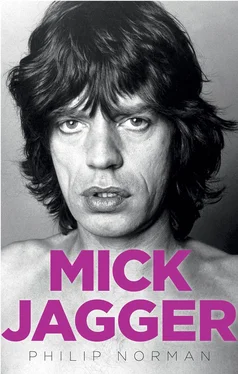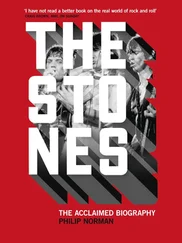CHAPTER FOUR FOUR ‘Self-Esteem? He Didn’t Have Any’ FIVE ‘“What a Cheeky Little Yob,” I Thought to Myself’ SIX ‘We Spent a Lot of Time Sitting in Bed, Doing Crosswords’ SEVEN ‘We Piss Anywhere, Man’ EIGHT Secrets of the Pop Stars’ Hideaway NINE Elusive Butterfly TEN ‘Mick Jagger and Fred Engels on Street Fighting’ PART II: THE TYRANNY OF COOL ELEVEN ‘The Baby’s Dead, My Lady Said’ TWELVE Some Day My Prince Will Come THIRTEEN The Balls of a Lion FOURTEEN ‘As Lethal as Last Week’s Lettuce’ FIFTEEN Friendship with Benefits SIXTEEN The Glamour Twins SEVENTEEN ‘Old Wild Men, Waiting for Miracles’ EIGHTEEN Sweet Smell of Success NINETEEN The Diary of a Nobody TWENTY Wandering Spirit TWENTY-ONE God Gave Me Everything Postscript Picture Section List of Searchable Terms Acknowledgements Also by Philip Norman Copyright About the Publisher
‘Self-Esteem? He Didn’t Have Any’ FOUR ‘Self-Esteem? He Didn’t Have Any’ FIVE ‘“What a Cheeky Little Yob,” I Thought to Myself’ SIX ‘We Spent a Lot of Time Sitting in Bed, Doing Crosswords’ SEVEN ‘We Piss Anywhere, Man’ EIGHT Secrets of the Pop Stars’ Hideaway NINE Elusive Butterfly TEN ‘Mick Jagger and Fred Engels on Street Fighting’ PART II: THE TYRANNY OF COOL ELEVEN ‘The Baby’s Dead, My Lady Said’ TWELVE Some Day My Prince Will Come THIRTEEN The Balls of a Lion FOURTEEN ‘As Lethal as Last Week’s Lettuce’ FIFTEEN Friendship with Benefits SIXTEEN The Glamour Twins SEVENTEEN ‘Old Wild Men, Waiting for Miracles’ EIGHTEEN Sweet Smell of Success NINETEEN The Diary of a Nobody TWENTY Wandering Spirit TWENTY-ONE God Gave Me Everything Postscript Picture Section List of Searchable Terms Acknowledgements Also by Philip Norman Copyright About the Publisher
Long before the Rolling Stones turned into a new kind of band and Mick into a new kind of singer, Andrew Loog Oldham was a totally new kind of manager.
Before Oldham, managers of pop acts – a pool of talent then 99.9 per cent male – had been older men with no interest in the music beyond what it might earn them, and no empathy with their young charges or with teenagers generally. Most in addition were homosexuals, which explains why so many early boy rock ’n’ rollers had the same rough-trade fantasy look of flossy blond hair, black leather, tight jeans and high-heeled boots. Andrew Oldham was the first manager to be the same age as his charges, to speak their language, share their outlook, mirror their rampant heterosexuality and seem motivated by their collective ideals as much as by financial gain. While engineering managerial coups that, at the outset, seemed little short of magical, he was naturally and undisputedly one of the band.
Managers of the traditional kind had been content to stay in the shadows, counting their percentages. Oldham, however, craved stardom in his own right and, from the earliest age, possessed all the drive, ruthlessness and shamelessness necessary to win it. He was ahead of his time in nurturing such ambition despite possessing no abilities whatsoever as either a performer or musician and, indeed, no quantifiable talent in any direction. The talent he did have – one of the very highest order – would emerge only when he began managing the Stones, which at the outset he saw primarily as a means of projecting himself into the spotlight.
The other two most celebrated managers in pop history, Colonel Tom Parker and Brian Epstein, both had little real comprehension of the artists under their control. With the Stones – particularly their singer – Oldham very quickly realised exactly what he had found and what to do with it. In all the annals of huckstering and hype, no one has possessed a shrewder understanding of both his product and his customers.
It is a familiar music-business cliché to give the name ‘Svengali’ to any manager who radically remoulds a performer’s appearance or persona. Svengali is one of the scarier figures in Victorian gothic literature, a music teacher with a black beard and a hypnotic stare, combining the auras of Dracula and the Phantom of the Opera. In George du Maurier’s 1894 novel, Trilby , the eponymous heroine, an innocent young artist’s model, allows Svengali to take her over, heart and soul, in exchange for transforming her into a world-famous operatic diva.
The analogy is always made with both Colonel Parker and Epstein, even though the managerial reshaping of Presley and the Beatles was purely cosmetic, impermanent, and reached neither their hearts nor their souls. In pop’s premier league, the Svengali–Trilby scenario has actually been played out just once: when Andrew Loog Oldham met Mick Jagger.
When it happened, it would stir yet more foreign influences into the making of Mick. Oldham’s arrestingly hybrid name commemorated his father Andrew Loog, a Dutch-American air-force lieutenant, shot down and killed while serving in Britain during the last years of the Second World War. His mother, born Cecelia Schatkowski, was the daughter of a Russian Ashkenazi Jew who, like Mick’s mother’s family, had emigrated to New South Wales in Australia. After arriving in Britain aged four – the same age Eva Jagger did – Cecelia became known as Celia and, like Eva, preferred to draw a veil of pukka Englishness over her origins.
Born in 1944, after his father’s death and out of wedlock, Oldham grew up in the literary-bohemian north London suburb of Hampstead and attended a first-rank private school, Wellingborough. Like his future Trilby, he possessed a keen intelligence but resolutely refused to live up to his academic promise, instead hungering for glamour and style and choosing the unlikeliest possible role models for a boy of his background. In Oldham’s case, these were not venerable blues musicians but the amoral young hustlers who swindled and finger-snapped their way through late 1950s cinema – Tony Curtis as Sidney Falco, the sleazy Broadway press agent in Sweet Smell of Success ; Laurence Harvey as Johnny Jackson, the prototype ‘bent’ British pop manager in Expresso Bongo .
When London first began to swing, Andrew Loog Oldham – by now a strawberry-blond nineteen-year-old with an educated accent and a killer line in suits and tab-collared shirts – was perfectly placed to hop aboard the pendulum. He became an odd-job boy at Mary Quant’s Bazaar boutique while working nights as a waiter at Soho’s Flamingo Club (where he could easily have sighted Mick but somehow never did). Given his mania for attention seeking, it was inevitable he should end up in public relations, a field until then also dominated by much older men and therefore largely uncomprehending of teenage music and culture.
Among Oldham’s earliest PR clients from the pop world, one left a lasting impression. This was America’s Phil Spector, the first record producer to become as famous as the acts he recorded, thanks to his trademark ‘Wall of Sound’ technique, the total artistic control on which he insisted, and his already legendary egotism and neurosis. Most fascinating to his young English minder was the simultaneous image of a maestro and hoodlum Spector cultivated, wearing dark glasses whatever the weather or time of day, travelling in limousines with blacked-out windows, and surrounding himself with more bodyguards than most current heads of state. If being a backroom boy could be like that, who needed the front parlour?
Oldham’s primary ambition was to be working with the Beatles, whose records now instantly topped the UK charts on release and who were showing themselves to be far more than just another pop group with their Liverpudlian charm and wit. Their breakthrough had allowed their manager, Brian Epstein, to successfully launch a whole troupe of ‘Mersey Beat’ acts, so destroying London’s historic anti-northern snobbery at a stroke and becoming the most successful British pop impresario ever.
Читать дальше












